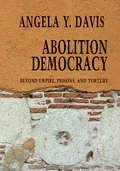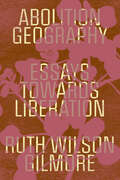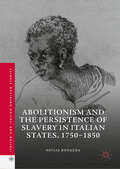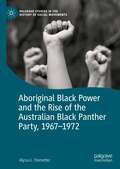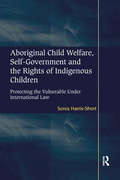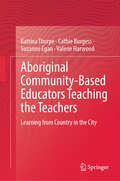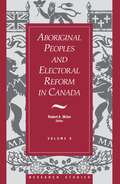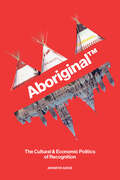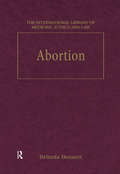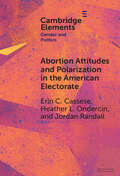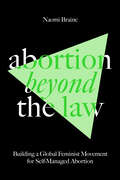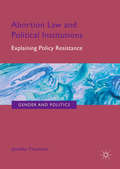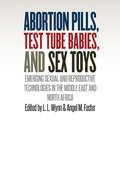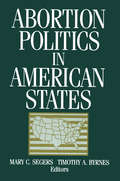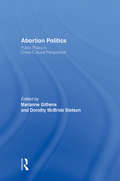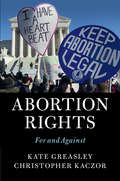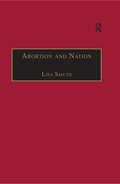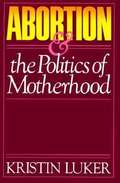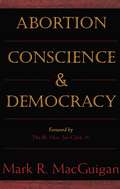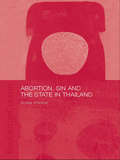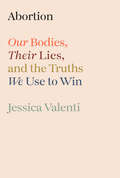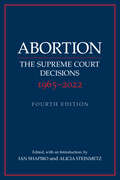- Table View
- List View
Abolition Democracy: Beyond Empire, Prisons, and Torture (Open Media Series)
by Angela Y. DavisRevelations about U.S policies and practices of torture and abuse have captured headlines ever since the breaking of the Abu Ghraib prison story in April 2004. Since then, a debate has raged regarding what is and what is not acceptable behavior for the world's leading democracy. It is within this context that Angela Davis, one of America's most remarkable political figures, gave a series of interviews to discuss resistance and law, institutional sexual coercion, politics and prison. Davis talks about her own incarceration, as well as her experiences as "enemy of the state," and about having been put on the FBI's "most wanted" list. She talks about the crucial role that international activism played in her case and the case of many other political prisoners.Throughout these interviews, Davis returns to her critique of a democracy that has been compromised by its racist origins and institutions. Discussing the most recent disclosures about the disavowed "chain of command," and the formal reports by the Red Cross and Human Rights Watch denouncing U.S. violation of human rights and the laws of war in Guantánamo, Afghanistan and Iraq, Davis focuses on the underpinnings of prison regimes in the United States.
Abolition Geography: Essays Towards Liberation
by Ruth Wilson GilmoreThe first collection of writings from one of the foremost contemporary critical thinkers on racism, geography and incarcerationGathering together Ruth Wilson Gilmore&’s work from over three decades, Abolition Geography presents her singular contribution to the politics of abolition as theorist, researcher, and organizer, offering scholars and activists ways of seeing and doing to help navigate our turbulent present. Abolition Geography moves us away from explanations of mass incarceration and racist violence focused on uninterrupted histories of prejudice or the dull compulsion of neoliberal economics. Instead, Gilmore offers a geographical grasp of how contemporary racial capitalism operates through an &“anti-state state&” that answers crises with the organized abandonment of people and environments deemed surplus to requirement. Gilmore escapes one-dimensional conceptions of what liberation demands, who demands liberation, or what indeed is to be abolished. Drawing on the lessons of grassroots organizing and internationalist imaginaries, Abolition Geography undoes the identification of abolition with mere decarceration, and reminds us that freedom is not a mere principle but a place. Edited with an introduction by Brenna Bhandar and Alberto Toscano.
Abolitionism and the Persistence of Slavery in Italian States, 1750–1850 (Italian and Italian American Studies)
by Giulia BonazzaThis volume offers a pioneering study of slavery in the Italian states. Documenting previously unstudied cases of slavery in six Italian cities―Naples, Caserta, Rome, Palermo, Livorno and Genoa―Giulia Bonazza investigates why slavery survived into the middle of the nineteenth century, even as the abolitionist debate raged internationally and most states had abolished it. She contextualizes these cases of residual slavery from 1750–1850, focusing on two juridical and political watersheds: after the Napoleonic period, when the Italian states (with the exception of the Papal States) adopted constitutions outlawing slavery; and after the Congress of Vienna, when diplomatic relations between the Italian states, France and Great Britain intensified and slavery was condemned in terms that covered only the Atlantic slave trade. By excavating the lives of men and women who remained in slavery after abolition, this book sheds new light on the broader Mediterranean and transatlantic dimensions of slavery in the Italian states.
Aboriginal Black Power and the Rise of the Australian Black Panther Party, 1967-1972 (Palgrave Studies in the History of Social Movements)
by Alyssa L. TrometterExamining transnational ties between the USA and Australia, this book explores the rise of the Aboriginal Black Power Movement in the 1960s and early 1970s. Aboriginal adaptation of the American Black Power movement paved the way for future forms of radical Aboriginal resistance, including the eventual emergence of the Australian Black Panther Party. Through analysis of archival material, including untouched government records, previously unexamined newspapers and interviews conducted with both Australian and American activists, this book investigates the complex and varied process of developing the Black Power movement in a uniquely Australian context. Providing a social and political account of Australian activism across Victoria, New South Wales and Queensland, the author illustrates the fragmentation of Aboriginal Black Power, marked by its different leaders, protests and propaganda.
Aboriginal Canada Revisited: Politics And Cultural Expression In The 21st Century (International Canadian Studies Series)
by Kerstin KnopfExploring a variety of topics—including health, politics, education, art, literature, media, and film—Aboriginal Canada Revisited draws a portrait of the current political and cultural position of Canada’s Aboriginal peoples. While lauding improvements made in the past decades, the contributors draw attention to the systemic problems that continue to marginalize Aboriginal people within Canadian society.From the Introduction: “[This collection helps] to highlight areas where the colonial legacy still takes its toll, to acknowledge the manifold ways of Aboriginal cultural expression, and to demonstrate where Aboriginal and non-Aboriginal people are starting to find common ground.”Contributors include Aboriginal and non-Aboriginal scholars from Europe and Canada, including Marlene Atleo, University of Manitoba; Mansell Griffin, Nisga’a Village of Gitwinksihlkw, British Columbia; Robert Harding, University College of the Fraser Valley; Tricia Logan, University of Manitoba; Steffi Retzlaff, McMaster University; Siobhán Smith, University of British Columbia; Barbara Walberg, Confederation College.
Aboriginal Child Welfare, Self-Government and the Rights of Indigenous Children: Protecting the Vulnerable Under International Law
by Sonia Harris-ShortThis volume addresses the contentious and topical issue of aboriginal self-government over child welfare. Using case studies from Australia and Canada, it discusses aboriginal child welfare in historical and comparative perspectives and critically examines recent legal reforms and changes in the design, management and delivery of child welfare services aimed at securing the 'decolonization' of aboriginal children and families. Within this context, the author identifies the limitations of reconciling the conflicting demands of self-determination and sovereignty and suggests that international law can provide more nuanced and culturally sensitive solutions. Referring to the UN Declaration on the Rights of Indigenous Peoples, and the UN Convention on the Rights of the Child, it is argued that the effective decolonization of aboriginal child welfare requires a journey well beyond the single issue of child welfare to the heart of the debate over self-government, self-determination and sovereignty in both national and international law.
Aboriginal Community-Based Educators Teaching the Teachers: Learning from Country in the City
by Suzanne Egan Valerie Harwood Katrina Thorpe Cathie BurgessThis book showcases the transformative impact of Aboriginal community-based educators teaching local histories and cultures to preservice teachers. It details the &‘Learning from Country in the City&’ teaching and research project, which follows preservice teachers who participated in immersive &‘Learning from Country&’ experiences in undergraduate Aboriginal education electives through to their first few years of teaching. Through storying Aboriginal community-based educator, preservice and early career teacher, and lecturer experiences, this book demonstrates the educational and emotional impact of Aboriginal truth telling processes and the significance of connecting with and learning from Country for all teachers and students. A visual representation of the pedagogical framework articulates this work which is designed to capture localised place-based learning processes and apply these principles to diverse contexts. The book presents photographs and maps of the places at the centre of this learning so educators, community members and readers can visualise how they might apply this methodology to their context. Importantly, this book positions Indigenous Knowledges, Aboriginal voices and ways of knowing, being and doing front and centre - asserting that this is essential foundational work needed to prepare young people for living in an ever-changing world.
Aboriginal Peoples and Electoral Reform in Canada: Volume 9
by Robert A. MilenThis volume features differing views of past, present, and possible future roles for Aboriginal people in the Canadian political and electoral system. The studies address the issues facing Aboriginal people and the efforts to increase their involvement in the federal electoral system. Robert Milen examines the development of Aboriginal political consciousness since the 1970s, with attention to recent constitutional and electoral initiatives and aspirations. Augie Fleras’ study considers the New Zealand system of guaranteed representation for the Maori and suggests how Canada might follow this example. Valerie Alia studies how the media deal with Aboriginal issues, basing her recommendations on interviews with Aboriginal people who offered her their views. Roger Gibbins critiques the idea of guaranteed Aboriginal representation in the House of Commons.
Aboriginal TM: The Cultural and Economic Politics of Recognition
by Jennifer AdeseIn Aboriginal™, Jennifer Adese explores the origins, meaning, and usage of the term “Aboriginal” and its displacement by the word “Indigenous.” In the Constitution Act, 1982, the term’s express purpose was to speak to specific “aboriginal rights”. Yet in the wake of the Constitution’s passage, Aboriginal, in its capitalized form, became increasingly used to describe and categorize people. More than simple legal and political vernacular, the term Aboriginal (capitalized or not) has had real-world consequences for the people it defined. Aboriginal™ argues the term was a tool used to advance Canada’s cultural and economic assimilatory agenda throughout the 1980s until the mid-2010s. Moreover, Adese illuminates how the word engenders a kind of “Aboriginalized multicultural” brand easily reduced to and exported as a nation brand, economic brand, and place brand—at odds with the diversity and complexity of Indigenous peoples and communities. In her multi-disciplinary research, Adese examines the discursive spaces and concrete sites where Aboriginality features prominently: the Constitution Act, 1982; the 2010 Vancouver Olympics; the “Aboriginal tourism industry”; and the Vancouver International Airport. Reflecting on the term’s abrupt exit from public discourse and the recent turn toward Indigenous, Indigeneity, and Indigenization, Aboriginal™ offers insight into Indigenous-Canada relations, reconciliation efforts, and current discussions of Indigenous identity, authenticity, and agency.
Abortion (The International Library of Medicine, Ethics and Law)
by Belinda BennettAbortion remains one of the most complex and controversial issues in contemporary law and bioethics. This volume draws together key essays from leading scholars on the ethical and regulatory aspects of abortion. The essays explore the complex issues of personhood, prenatal life and reproductive rights, international perspectives on the regulation of abortion, health professionals and the provision of abortion services, and prenatal diagnosis and abortion. This volume will be an invaluable tool for all those interested in this challenging area.
Abortion Attitudes and Polarization in the American Electorate (Elements in Gender and Politics)
by Erin C. Cassese Heather L. Ondercin Jordan RandallAbout two-thirds of Americans support legal abortion in many or all circumstances, and this group finds itself a frustrated majority following the Supreme Court's 2022 decision in Dobbs v. Jackson Women's Health Organization which overturned the legal precedent set in Roe v. Wade. Previous scholarship argues intense minorities can secure favorable policy outcomes when facing off against a more diffuse and less motivated majority, creating incongruence between public opinion and policy. This Element focuses on the ways that preference intensity and partisan polarization have contributed to the current policy landscape surrounding abortion rights. Using survey data from the American National Election Studies, the authors identify Americans with intense preferences about abortion and investigate the role they play in electoral politics. They observe a shift in the relationship between partisanship and preference intensity coinciding with Dobbs and speculate about what this means for elections and policy congruence in the future.
Abortion Beyond the Law: Building a Global Feminist Movement for Self-Managed Abortion
by Naomi BraineHow feminists across Latin America, Africa, and Europe are making self-managed abortion available to all–and the strong transnational feminist movement they have built along the wayThe feminists across Latin America, Africa, and Europe making self-managed abortion available to all - and the transnational movement they have built along the wayDrawing on years of research with activists around the world, sociologist Naomi Braine describes the strategies, politics, and tactics of direct action feminists bringing abortion pills, information, and support to people seeking to end unwanted pregnancies. From combatting the legal strictures of Bolsonaro's Brazil, to navigating the NGO-dominated landscape of Kenya and Nigeria, feminist activists are making safe, accessible abortion care available against the odds.Even more important, these women are building a robust transnational feminist network. Tactics developed in the Global South - hotlines, practices of accompaniment and peer-to-peer care, and scientific information - are now being shared with activists in Europe and North America, building a new model for international feminist solidarity.
Abortion Law and Political Institutions: Explaining Policy Resistance (Gender and Politics)
by Jennifer ThomsonThis book provides a comprehensive study of abortion politics and policy in Northern Ireland. Whilst there is a substantial amount of literature on abortion in Ireland and the rest of the United Kingdom, there has been scant academic attention paid to the situation in Northern Ireland. Adopting a feminist institutionalist framework, the book illustrates the ways in which abortion has been addressed at both the national institution at Westminster and the devolved institution at Stormont. Covering the period from early peace process in the 1980s to the present day, the text will be of interest to politics scholars, but also sociologists, historians and students of Irish studies.
Abortion Pills, Test Tube Babies, and Sex Toys: Emerging Sexual and Reproductive Technologies in the Middle East and North Africa
by L. L. Wynn Angel M. FosterFrom Viagra to in vitro fertilization, new technologies are rapidly changing the global face of reproductive health. They are far from neutral: religious, cultural, social, and legal contexts condition their global transfer. The way a society interprets and adopts (or rejects) a new technology reveals a great deal about the relationship between bodies and the body politic. Reproductive health technologies are often particularly controversial because of their potential to reconfigure kinship relationships, sexual mores, gender roles, and the way life is conceptualized. This collection of original ethnographic research spans the region from Morocco and Tunisia to Israel and Iran and covers a wide range of technologies, including emergency contraception, medication abortion, gamete donation, hymenoplasty, erectile dysfunction, and gender transformation.
Abortion Pills, Test Tube Babies, and Sex Toys: Emerging Sexual and Reproductive Technologies in the Middle East and North Africa
by L. L. Wynn and Angel M. FosterFrom Viagra to in vitro fertilization, new technologies are rapidly changing the global face of reproductive health. They are far from neutral: religious, cultural, social, and legal contexts condition their global transfer. The way a society interprets and adopts (or rejects) a new technology reveals a great deal about the relationship between bodies and the body politic. Reproductive health technologies are often particularly controversial because of their potential to reconfigure kinship relationships, sexual mores, gender roles, and the way life is conceptualized. This collection of original ethnographic research spans the region from Morocco and Tunisia to Israel and Iran and covers a wide range of technologies, including emergency contraception, medication abortion, gamete donation, hymenoplasty, erectile dysfunction, and gender transformation.Table of ContentsAcknowledgments Introduction | Setting the Context: Sexuality, Reproductive Health, and Medical Technologies in the Middle East and North Africa Angel M. Foster and L. L. Wynn Part I | Preventing and Terminating PregnancyIs There an Islamic IUD? Exploring the Acceptability of a Hormone-Releasing Intrauterine Device in Egypt Ahmed Ragaa A. RagabIntroducing Emergency Contraception in Morocco: A Slow Start after a Long Journey Elena ChopyakMifepristone in Tunisia: A Model for Expanding Access to Medication Abortion Angel M. FosterNavigating Barriers to Abortion Access: Misoprostol in the West Bank Francoise Daoud and Angel M. Foster Part II | Achieving Pregnancy and Parenthood"Worse comes to worst, I have a safety net": Fertility Preservation among Young, Single, Jewish Breast Cancer Patients in Israel Daphna Birenbaum-Carmeli, Efrat Dagan, and Suzi Modiano GattegnoThe "ART" of Making Babies Using In Vitro Fertilization: Assisted Reproduction Technologies in the United Arab Emirates Shirin KarsanWanted Babies, Excess Fetuses: The Middle East's In Vitro Fertilization, High-Order Multiple Pregnancy, Fetal Reduction Nexus Marcia C. InhornBirthing Bodies, Pregnant Selves: Gestational Surrogates, Intended Mothers, and Distributed Maternity in Israel Elly TemanC-Sections as a Nefarious Plot: The Politics of Pronatalism in Turkey Katrina MacFarlane Part III | Engaging Sex and SexualityHPV Vaccine Uptake in Lebanon: A Vicious Cycle of Misinformation, Stigma, and Prohibitive Costs Faysal El-KakHymenoplasty in Contemporary Iran: Liminality and the Embodiment of Contested Discourses Azal Ahmadi"Viagra Soup": Consumer Fantasies and Masculinity in Portrayals of Erectile Dysfunction Drugs in Cairo, Egypt L. L. WynnSex Toys and the Politics of Pleasure in Morocco Jessica Marie NewmanNarratives of Gender Transformation Practices for Transgender Women in Diyarbakir, Turkey M. A. Sanders Conclusion | Individual, Community, Religion, State: Technology at the Intersection Donna Lee BowenAcronyms and AbbreviationsGlossary of Foreign TermsBibliographyContributorsIndex
Abortion Politics in American States
by Timothy A. Byrnes Mary C. SegersThe essays presented here draw from the Soviet Interview Project's evidence of the internal condition of the CPSU party during the "era of stagnation" and its role, influence, and impact on the operation of legal and economic institutions and state bureaucracies.
Abortion Politics in Congress
by Scott H. Ainsworth Thad E. HallThis book examines how legislators have juggled their passions over abortion with standard congressional procedures, looking at how both external factors (such as public opinion) and internal factors (such as the ideological composition of committees and party systems) shape the development of abortion policy. Driven by both theoretical and empirical concerns, Scott H. Ainsworth and Thad E. Hall present a simple, formal model of strategic incrementalism, illustrating that legislators often have incentives to alter policy incrementally. They then examine the sponsorship of abortion-related proposals as well as their committee referral and find that a wide range of Democratic and Republican legislators repeatedly offer abortion-related proposals designed to alter abortion policy incrementally. Abortion Politics in Congress reveals that abortion debates have permeated a wide range of issues and that a wide range of legislators and a large number of committees address abortion.
Abortion Politics: Public Policy in Cross-Cultural Perspective (Gender And Politics Ser.)
by Marianne Githens Dorothy McBRIDE StetsonAbortion Politics: Public Policy in Cross Cultural Perspective focuses on current abortion policy and practice in the United States, Canada, Europe and Japan and aims to provide a comprehensive, stimulating and balanced picture of current abortion policy in a cross-cultural perspective. The contributors deal with comparative abortion policy including recent developments in Ireland, Germany and Eastern Europe.
Abortion Rights: For and Against (Routledge Annals Of Bioethics Ser.)
by Christopher Kaczor Kate GreasleyThis book features opening arguments followed by two rounds of reply between two moral philosophers on opposing sides of the abortion debate. In the initial opening essays, Kate Greasley and Christopher Kaczor lay out what they take to be the best case for and against abortion rights. In the ensuing dialogue, they engage with each other's arguments and each responds to criticisms fielded by the other. Their conversational argument explores such fundamental questions as: what gives a person the right to life? Is abortion bad for women? And what is the difference between abortion and infanticide? Underpinned by philosophical reasoning and methodology, this book provides opposing and clearly structured perspectives on a highly emotive and controversial issue. The result gives readers a window into how moral philosophers argue about the contentious issue of abortion rights, and an in-depth analysis of the compelling arguments on both sides.
Abortion and Nation: The Politics of Reproduction in Contemporary Ireland
by Lisa SmythAbortion politics are contentious and divisive in many parts of the world, but nowhere more so than in Ireland. Abortion and Nation examines the connection between abortion politics and hegemonic struggles over national identity and the nation-state in the Irish Republic. Situating the abortion question in the global context of human rights politics, as well as international social movements, Lisa Smyth analyses the formation and transformation of abortion politics in Ireland from the early 1980s to the present day. She considers whether or not the shifting connections between morality, rights and nationhood promise a new era of gender equality in the context of nation-state citizenship. The book provides a new sociological framework through which the significance of conflict over abortion and reproductive freedom is connected to conflict over national identity. It also offers a distinctive in-depth consideration of the connection between gender and nationhood, particularly in terms of its impact on women's status as citizens; within the nation-state; within the European Union; and as members of a global civil society.
Abortion and the Politics of Motherhood
by Kristin LukerKristin Luker examines the issues, people, and beliefs on both sides of the abortion conflict and draws data from twenty years of public documents and newspaper accounts, as well as over two hundred interviews with both pro-life and pro-choice activists.
Abortion, Conscience and Democracy
by Mark R. MacguiganFew issues have polarized Canadians and Americans as much as the abortion debate. In this thoughtful and thought-provoking reflection on the implications the law on abortion has on democracy, Mark MacGuigan brings a much-needed perspective to this controversial subject. Few people are as well qualified to do so: MacGuigan is a former law professor, minister of justice and attorney general of Canada, a Catholic, and a federal appellate-court judge.Distinguishing carefully between morality and the law, MacGuigan includes a history of the criminal law, the Catholic Church’s views, and the often-ignored roles of individual conscience, freedom and responsibility in democracy. He reviews the essential debate, important case histories, and the evolving social perspectives that have attached themselves to discussions of abortion. he also includes chapters on the related issues of contraception and euthanasia.MacGuigan refers to a wide range of influential and international documents and judgements: papal encyclicals, the Wolfenden Report, Roe vs. Wade, a ruling in a case that involved Dr. Henry Morgentaler, and numerous other sources. With great candour, MacGuigan also explores how his own attitude and position have changed to the point where he now opposes any legislation limiting abortion before viability.Those who are seeking clarity of the issues and those who want to uncloud the rhetoric and the arguments should not miss reading this important work.
Abortion, Sin and the State in Thailand (ASAA Women in Asia Series)
by Andrea WhittakerThis book discusses abortion in a non-Western, non-Christian context - in Thailand, where over 300,000 illegal abortions are performed each year by a variety of methods. The book, based on extensive original research in the field, examines a wide range of issues, including stories of the real-life dilemmas facing women, popular representations of abortion in the media, the history of the debate in Thailand and its links to politics. Overall, the work highlights the voices of women and their subjective experiences and perceptions of abortion, and places these 'women's stories' in an analysis of broader socio-political gender and power relations that structure sexuality and women's reproductive health decisions.
Abortion: Our Bodies, Their Lies, and the Truths We Use to Win
by Jessica ValentiNEW YORK TIMES BESTSELLER • In a stirring and succinct examination of post-Roe America, &“one of the most successful and visible feminists of her generation&” (Washington Post) takes on what&’s become the country&’s most resonant political issue. In her most urgent book yet, New York Times bestselling author Jessica Valenti shines a light on the conservative assault on women&’s freedom, cutting through the misinformation and overwhelm to inform, engage, and enrage. From the attacks Americans know about to the ones anti-abortion lawmakers and groups are trying to hide, Valenti details the tactics and horrors that she&’s been painstakingly tracking in her acclaimed newsletter, Abortion, Every Day. Abortion gives voice to women&’s frustration and outrage in a moment when they&’re fed up with being talked over and diminished. And in an election year when abortion is dominating the national conversation, Valenti provides the language, facts, and context readers need to feel confident when talking about the attacks on their bodies and freedom. Abortion is a handbook for the overwhelming majority of Americans who support abortion rights, whether they&’re seasoned activists or those just starting to learn. With the wit, expertise, and blunt moral clarity that&’s made her writing popular for decades, Valenti offers an essential manifesto in an urgent moment.
Abortion: The Supreme Court Decisions 1965–2022
by Ian Shapiro Ed. Alicia SteinmetzThis new edition of Abortion: The Supreme Court Decisions includes all of the major Supreme Court decisions on abortion since the 1960s—as well as many majority, dissenting, and plurality opinions—carefully edited for use by researchers, journalists, and teachers in a variety of disciplines.
